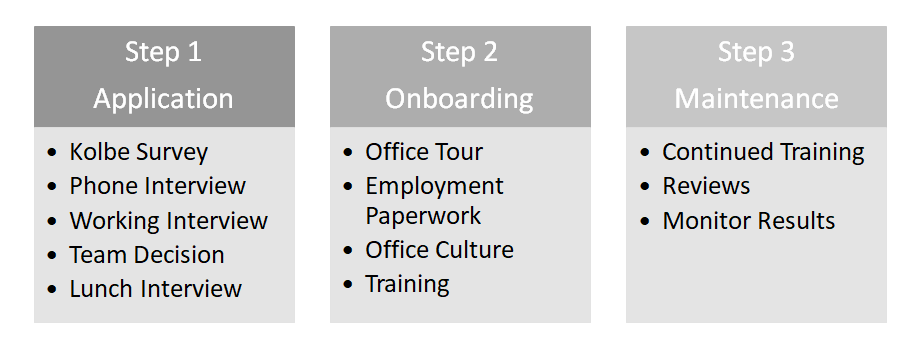Build Your Dream Team!

“Surround yourself with the best people you can find, delegate authority and don’t interfere as long as the policy you’ve decided upon is being carried out.” – Ronald Reagan
Hire for Attitude and Train for Results
The one thing I have learned about personality traits is that you cannot teach a person how to like other people. It’s not for a lack of trying, but naturally liking other people is just something that cannot be taught. That’s huge. Healthcare is all about relationships, and if your team members don’t understand people and how to develop relationships, your practice is doomed to fail.
My practice really started to grow shortly after I figured this out. I figured out that I needed to focus on the quality traits required for each position. Does a prospective team member connect with people? Do they enjoy interacting with other people and take a genuine interest in others? That’s where we started to build our dream team. You are off to a good start if you can find a team who likes people, has good energy and is open to learning. There is a very good chance you will be able to train and mentor those people.
However, if anyone in your staff doesn’t like people or is closed-minded to learning, you will have a lot of difficulty with that team member and will probably feel like you are banging your head against the wall.
We have a system when it comes to finding the people with the qualities and traits we’re looking for.
How we pick our Dream Team

The first step is the application. To complete the entire application process, a candidate for any position on our team must complete a Kolbe Survey. In short, the Kolbe Wisdom (http://www.kolbe.com/) suggests that instincts drive a person’s behavior and that these behaviors lead to a pattern of an individual’s unique method of operation or modus operandi (M.O.). We use the Kolbe assessments as a screening tool, as well as a guidance device, to determine the likelihood that we will have a good match of the individual’s qualities and traits and the positions/roles we need to fill. We also use NY Times Bestselling Author, Gretchin Rubin’s Four Tendencies quiz as a tool to determine how the team member (or potential team member) deals with inner and outer expectations. (Google: Gretchin Rubin Four Tendencies Quiz)
The next step is our list of prospective candidates we’ve selected to participate in a telephone interview with my office manager. They are amazing at establishing rapport quickly and getting the other person to feel comfortable enough to let their guard down and have a real conversation. There are specific steps the manager follows in this call, which includes a series of questions, along with sharing our mission, vision and values. There is a specific Kolbe score that can be used to increase the likelihood of matching the person to the correct role.
The third step is the working interview. I love this part of recruiting. We invite the candidate to come into our office and spend some time with the team during a normal workday. This serves both sides and helps all of us to get to know each other–the team and the prospective recruit. We also get to see how they might function in our professional environment. The length of the shift varies. All that matters is that the shift is long enough for the prospect to briefly shadow their potential position and for us to observe them.
The fourth step is that the team decides with the office manager whom they would like to hire. It makes sense, doesn’t it? The team should have input into who they are going to spend the better part of their days working with side-by- side. This has had a profound impact in our camaraderie. The team feels they are part of the decision process and have ownership of the final decision. When the new recruit is hired, the entire team has a vested interest in helping them succeed. Oh, and the cherry on top of the recruitment sundae is that the new recruit KNOWS they were chosen by the team and now has ownership to live up to the team’s expectations.
The final step before onboarding is an interview over lunch/coffee with me. This isn’t always possible, so sometimes it is just a call, but nonetheless, I am the last person in line. This is a chance for me to see how they interact with other people in a social setting. By this point, they are far less guarded and I get to see their real personality. How are their conversation skills? How are they treating the waiter/waitress? How do they behave when their order arrives late or perhaps incorrectly?
I ask questions like, “How do you present and motivate patients to accept treatment plans? Or, “Have you ever sold home care equipment to patients, like toothbrushes etc.? I specifically use the word sold so I can gauge their reaction to having sales as part of their responsibilities. Lastly, I get a chance to ask them about their comfort level with certain tasks, their desired income target, goals and dreams. I want to find out if they have a vision for themselves or if they’re just wandering aimlessly through their career.
Here is why this system works so well: I found out that one of the things I suck at is hiring people. I promise I will always be honest with you and a little vulnerable. I have over a 50% failure rate in choosing whom to hire in operations when it’s exclusively left up to me.
I discovered I would hire people who were the most like me because I liked them (we were very similar) and not because they were right for the position. That is why failure rates climbed to about 50% or more. We have team members like our office managers who are much more effective at hiring and have a 70% success rate or higher. Who should be doing the hiring? We don’t always follow this exactly, but the more we do, the more successful our hiring process becomes.
This process works extremely well when you already have a few key team members. If you are still a solopreneur or have a very small team and need to recruit for a position or two, it can be difficult to get a good outcome using internal resources. You will need to look for outside help. Perhaps you have a spouse who can assist. A spouse can be invaluable in this process because they know you well and have a keen insight into your weaknesses and shortfalls. Additionally, they have a vested interest in helping you find key employees who can help you build a high-performance practice. Not to mention an efficient business will make you happier when you come home to the family. You can also rely on your coaches and mentors to help you. Outside agencies can also be a resource.




